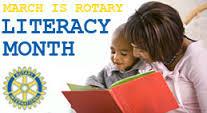March is Literacy Month
Literacy is the ability to read, write and do basic math as well as to communicate, solve problems, learn and use technology.
Literacy is THE fundamental life skill necessary today for every human being to achieve personal and economic success.
Sadly, 800 million (1 in five) adults in the world today are functionally illiterate, Two thirds of these unfortunate people are concentrated in the eight African and Asian countries of Bangladesh, China, Egypt, Ethiopia, Indonesia, Nigeria and Pakistan. There is also a gender bias with females representing the vast majority of the worlds’ illiterate.
Literacy skills open the door to education and thus enable people to overcome poverty, disease and to fulfill their potential. Education and of course literacy is essential to improve the health and the life expectancy for the worlds’ poorest. This confirmed by the fact that a child born to a literate mother is 50% more likely to survive past 5 years old.
The World Counsel on Literacy estimates the annual global cost of illiteracy to be a staggering $1.2 trillion. Without a literate population of at least 40%, no country has ever achieved continuous and/or rapid economic growth.
The effects of illiteracy are not limited to third world and developing countries. To study the impact of illiteracy we have to look no further than our own back yard. Although Canada has one of the worlds most educated populations, over 40% of Canadian adults lack the literary skills for coping with everyday life and work, resulting in criminality, unemployment and poverty. Within the justice system criminal offenders have literacy problems three times greater than the rest of the population and individuals serving prison sentences of two years or more have on average only a level of education of only grade 7. In Canada an illiterate adult is twice as likely to be unemployed and three times more likely to rely on social assistance. Also, 50% of people with low literacy skills live in poverty in contrast to the only 8% of people with high levels of literacy.
Rotary International coordinates, sponsors and facilitates over 50 education and literacy projects throughout the world at any time. From building and renovating schools, providing books, computers and supplies and training teachers to providing ophthalmologic surgery to young children in India suffering from vision problems affecting their ability to read and learn.
The Rotary Club of West Vancouver annually provides financial support to the Samsara project in Thailand, building schools, teacher accommodations and fresh water systems. Locally the club provides multiple post-secondary school scholarships to West Vancouver high school students.
